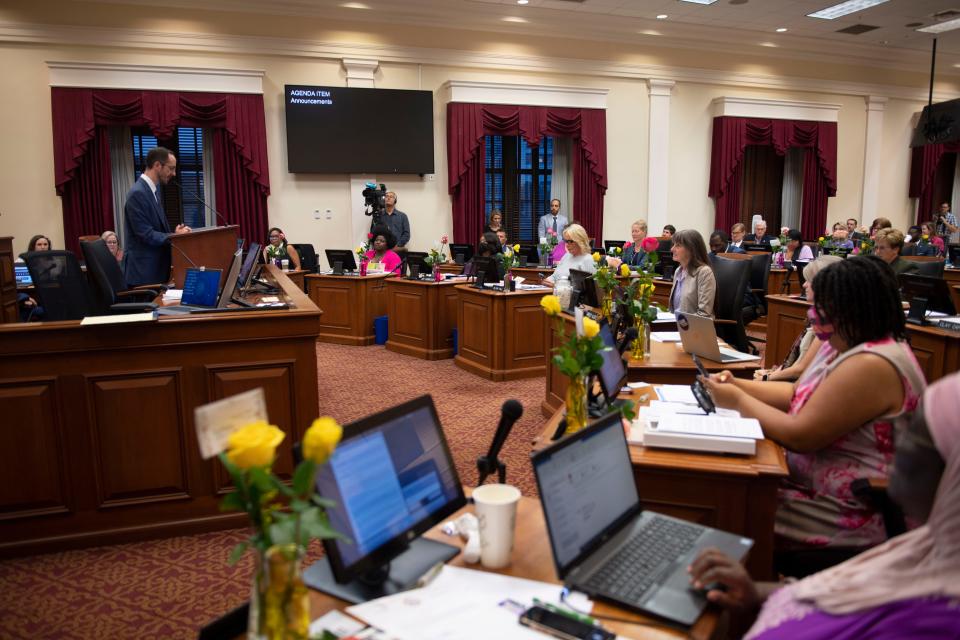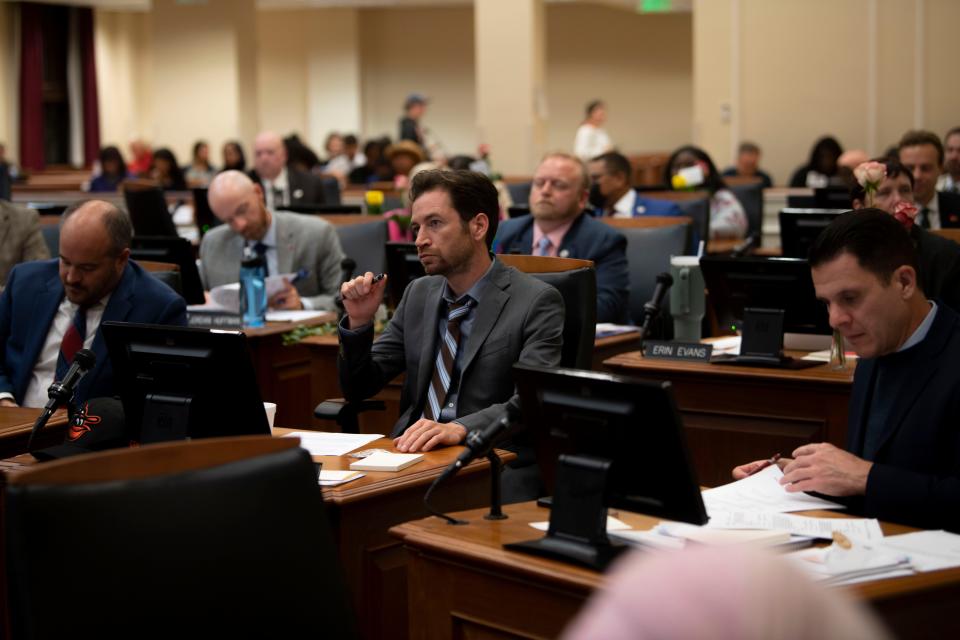Early friction: New Nashville council disagrees on public safety funding at first meeting
Nashville's new Metro Council signaled some early friction around public safety strategies and the consideration of police funding in its first meeting Tuesday.
After lengthy discussion in Metro's Public Health and Safety Committee and on the council floor, council members voted to defer the acceptance of a $3.4 million grant that would partially reimburse Metro police for the salaries of School Resource Officers in Nashville's public middle and high schools to allow time to answer council and community questions.
An application for a $675,000 state grant that would be used to purchase equipment, increase staffing and fund the "Nashville Police Activities League" — an initiative meant to build relationships between police and at-risk youths — was deferred by rule after the Public Health and Safety Committee determined they needed more details about supervision, participation of non-sworn personnel, equipment and staffing intentions and data for ZIP codes identified as "targets" for the initiative.
Several council members, including newly-elected civil rights attorneys Joy Kimbrough (District 1) and Jeff Preptit (District 25) pushed for more careful consideration of police-involved grant programs and special attention to guarding against potential negative impacts on vulnerable communities.
First-time council members make up about half of the council, with the rest consisting of reelected incumbents or members with previous council experience.

After a failed deferral attempt, the council ultimately approved the acceptance of a $600,000 state grant for enhancing a DUI enforcement initiative and targeting distracted driving and seatbelt enforcement, with a quarter of the 40-member body abstaining from the vote.
Some public safety items passed with little to no conflict. The council approved on consent a $45,500 grant to "Pass the Beauty" to support South Nashville community safety programs alleviating financial stress, providing an anti-domestic violence program and support group for women, and offering therapy and workshops for mental and physical health. The funding comes from Metro's Community Safety Fund.
Also approved:
an application for a courtroom security grant
acceptance of a state grant funding enhanced recovery court programs under the Alcohol Countermeasures Highway Safety Project
a purchasing agreement for pursuit vehicles and emergency vehicles for first responders
acceptance of a state grant for enhancing support services for crime victims
an application for a federal grant for special training and equipment for police personnel to maintain certifications for criminal investigation and crime reduction initiatives
Grant for School Resource Officers sparks debate
The $3.4 million state grant for School Resource Officers would partially reimburse Metro police for the salaries of SROs currently posted at all of Nashville's public middle and high schools.
Seamus Purdy, a high school senior, attended Tuesday's meeting to speak against the SRO grant funding, referencing studies that concluded police in schools correlate with increased suspension rates, decreased graduation rates and disproportionate punishment for minority students.
"Students deserve accessible nurses, social workers, psychologists, emotional counselors and care professionals," Purdy said. "We deserve people who will build a healthy community without sparking anxiety within students."
Deputy Chief Chris Guilder said during a Tuesday Public Health and Safety Committee meeting that the memorandum of understanding between Metro schools and the police department is clear on the responsibility of SROs.
"They are not there ... to engage in disciplinary matters," Gilder said. "They're there to be a police officer in the event that there is a crime issue or emergency that arises."

Those issues can include weapons brought to campus, discovery of drugs or contraband or fights, Gilder said. Preptit asked how officers make a determination between "simple classroom matters" and criminal matters, and what circumstances would spur police intervention in the case of a fight. Gilder said he was not aware of a specific MNPD policy dictating that line.
Preptit referenced a 2018 Center for Civil Rights Remedies publication that found Black students in Tennessee received 90 more days of out-of-school suspension than their white peers for the same or similar offenses. While there isn't direct statistics that indicate an issue in Nashville, Preptit said it's important for the council "to understand the full context of officers in schools and ... make sure (MNPS and MNPD) leaders structure guidelines as to when there's going to be officer intervention to ensure that our schools are safe and tranquil environments for all of our students."
A deferral, District 7 Council member Emily Benedict said, is a useful tool for the council to gather information, get answers and provide more transparency.
District 26 Council member Courtney Johnston and District 27 Council member and former police officer Robert Nash voiced their objections to the deferral.
"This funding is to pay for SROs that are already there," Johnston said. "Saying no to this funding just puts the entire financial burden on Metro taxpayers."
After a member of the administration confirmed a deferral would not put the grant funding at risk, the deferral passed 38-1, with Johnston voting against. Nash did not cast a vote.
DUI grant raises concerns but secures approval
Kimbrough pushed for the deferral of another grant funding DUI and distracted driving enforcement, citing concerns that a reporting requirement for the grant would equate to "quotas" for stops and arrests. The grant would also require Metro police to clear any public statements with the granting agency before releasing them to the public, she said. Terms like "distracted driving" are ambiguous, she added, and can open doors to pretextual stops, or traffic stops initiated by police for minor violations as a means to search for evidence of more serious — and at times unrelated — crimes.
"When you start having to make reports to keep money, that's (quotas). When you talk about policing quotas, it automatically leads to pretextual stops," Kimbrough said during a committee meeting.
Kimbrough said she's concerned the Metro Council is "becoming rubber stamps for whatever comes through."
"Departments say, 'This is what we need' … And then we say, 'Okay, that's all right. We've got to approve it, approve it, approve it, approve it because it has MNPD on it,'" she said.
Nash said he's not sure what questions the council has "about every grant that seems to involve the police department," adding the DUI grant has been accepted for "a long time" and it pays for overtime for officers "getting some dangerous drivers off the streets."
In a committee meeting, he added that Nashville's police department significantly changed its approach to traffic stops following the 2016 release of the "Driving While Black" report that found racial profiling in Metro Nashville traffic stops.
Kimbrough's deferral effort failed, and the grant was approved 29-1 with 10 abstentions. Kimbrough was the sole "no" vote.
This article originally appeared on Nashville Tennessean: New Nashville council disagrees on public safety funding

